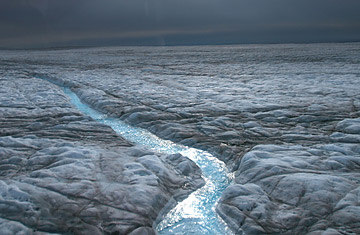
Melted water runs over a glacier in Greenland.
(3 of 3)
In any event, it is hardly as if Russia were the only nation to see the Arctic as a place to burnish national pride. The Norwegians have their new gas field, and Denmark is pursuing proof of its own claims just as doggedly as the Russians--though in a more consensual, Scandinavian mode. The Danes enlisted both a Swedish and a Russian icebreaker for its expedition to the largely uncharted waters north of Greenland to document what Science Minister Helge Sander refers to as "our hopefully justified claim of a continental shelf from Greenland toward the North Pole." The Danes know that scientific inquiry alone will not determine who gets what in the north. "When we are talking resources, we are also talking politics," says Sander, who predicts that the demarcation of rights to the Arctic will end with a "dogfight at the International Court of Justice in the Hague."
If it does, expect Canadians to have one of the biggest dogs there--for Ottawa has never been shy about asserting ownership to much of the Arctic. In 1907 a senator claimed a Canada-wide triangle right up to the Pole, and there's still a plaque on Melville Island commemorating that assertion. As a spur to maple-leaf nationalism, it is not just the Russians and Danes that Canadians have to worry about in the Arctic but also their giant neighbor to the south. When Prime Minister Harper declared in August that the "first principle of Arctic sovereignty is use it or lose it," he was directing his message partly at Washington. The U.S. has long claimed that the Northwest Passage is an international strait through which all ships have the right to travel, whether Canadians want them there or not. That line has always rankled Canadians but never more so than now that the ice is disappearing. "I'll jump up and down and say it--the passage is Canadian," says Josh Hunter, Resolute's senior administrative officer. "If the Americans try to come through unwanted, we'll be out there on our snowmobiles blocking their passage."
Even backed by the new icebreaker fleet Harper has promised, that's not much of a deterrent. In truth, of course, it isn't military encroachment the Canadians fear so much as the environmental peril that may come from unregulated use of their waters. Cruise ships transporting Arctic ecotourists, many of them Russian vessels hired out to Western tour operators, anchored off Resolute 17 times this year alone. Once the Northwest Passage becomes not just a tourist destination but a viable commercial route that would cut an astonishing 5,000 miles (8,000 km) from the distance between Asia and Europe through the Panama Canal, shipping traffic could explode. "The idea of Liberian-registered tankers chugging through the Northwest Passage or oil spills that can't be cleaned up--that's what terrifies me," says Mike Beedell, an Arctic adventurer who sailed a small sailboat through the passage 20 years ago.
With all the other Arctic nations making their plays, it would be too much to expect the U.S.--an Arctic state itself, thanks to Alaska--to stand idly by. The Coast Guard icebreaker now on its way back from plying the waters of the Chukchi Cap, north of the Bering Strait, has charted the seafloor with a multibeam echo sounder to delineate where Alaska's continental shelf ends and the depths of the Arctic Ocean begin. But to press its case for extended territorial waters, as the other Arctic nations are doing, the U.S. needs to sign the convention. Some conservatives have always depicted the treaty as a no-win giveaway of U.S. sovereignty that would cast the baleful shadow of "world government" over the high seas and that might, for example, bar the U.S. from interdicting ships suspected of terrorist ties. Given the Senate's rules, opponents of the treaty have plenty of chances to use procedural dodges to kill it. But at hearings on the convention due to begin on Sept. 27, Senate Foreign Relations Committee chairman Joseph Biden will be able to muster support for ratification not only from the Bush Administration and the military but also from groups as disparate as the American Petroleum Institute, whose members would like to exploit the Arctic, and the World Wildlife Fund, whose supporters would like to stop them from doing so. With such backing, supporters of the treaty are guardedly optimistic that this time it will be ratified. The convention is "critical to our national interests as a maritime power and as the world's leading economy," Biden told Time. "Its ratification is long overdue."
How can competing claims to the Arctic--of environmentalists and entrepreneurs, nations and natives--be reconciled? Antarctica, with no native population, has been saved from international competition by a treaty signed in 1959, which (among other things) bans all mining there until 2041. There have always been advocates of such an approach in the Arctic, but given well-established local populations and long-standing national claims, they have never gotten very far.
Meanwhile, as they always have, adventurers, hucksters and dreamers will continue to make their way north--some of them in bikinis. Iceland's Valsson sees the Arctic as "the new Mediterranean," with warming temperatures fostering new centers of civilization in Siberia and Arctic Canada. Hammerfest bears witness to some of that: the population is booming, and a sense of hope infuses the economy. But as winter approaches in Resolute and the lowering sky turns dark, Kalluk, the Inuit hunter, suspects that dreams of a new world in the north are overdone. "Whatever else happens," he says, "the sun will still disappear for a good part of the year." The unanswered question is whether that will be enough to preserve the harsh beauty that he and others in the Arctic have long known and cherished.
